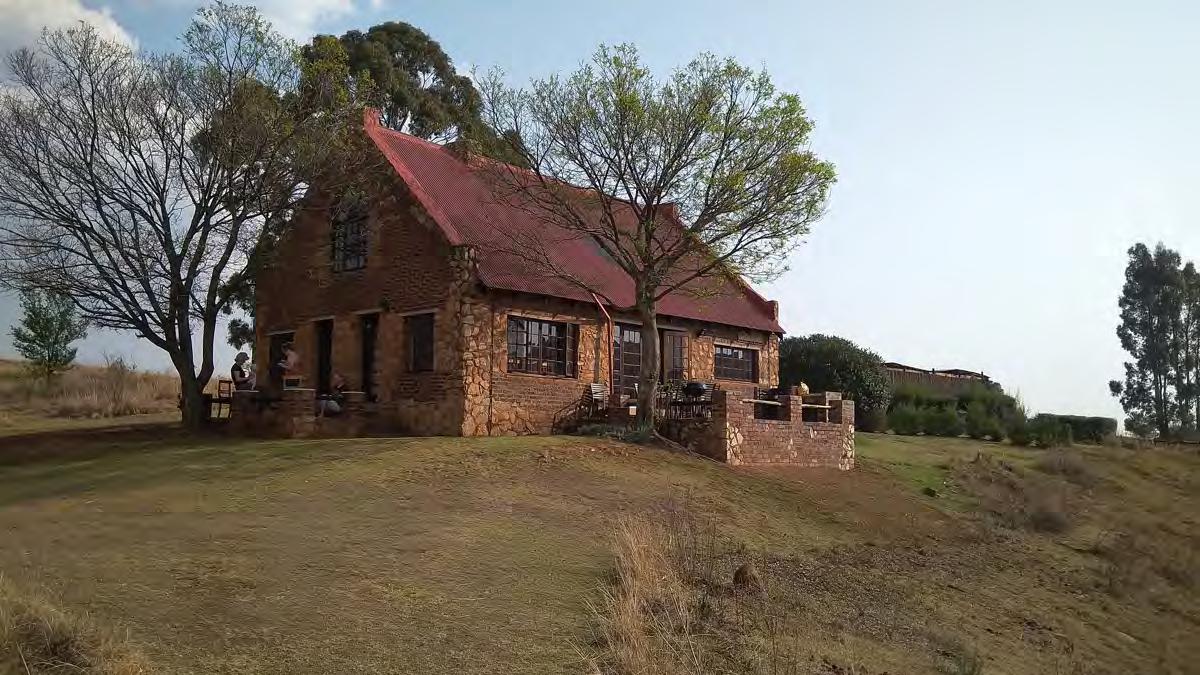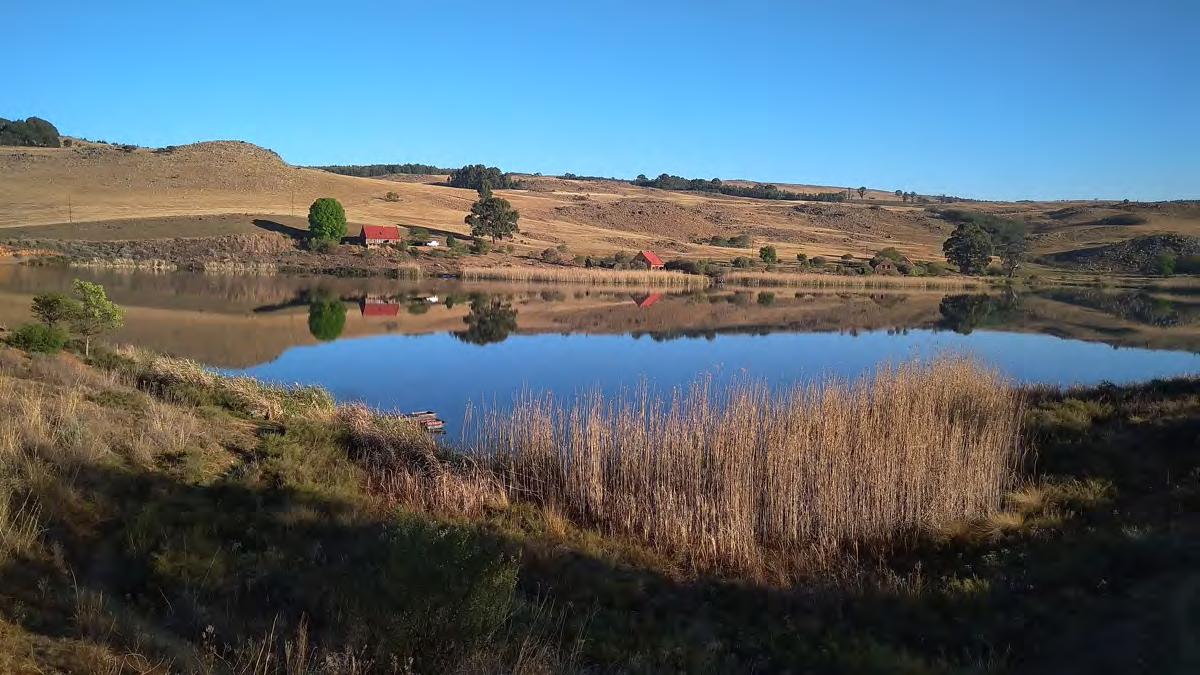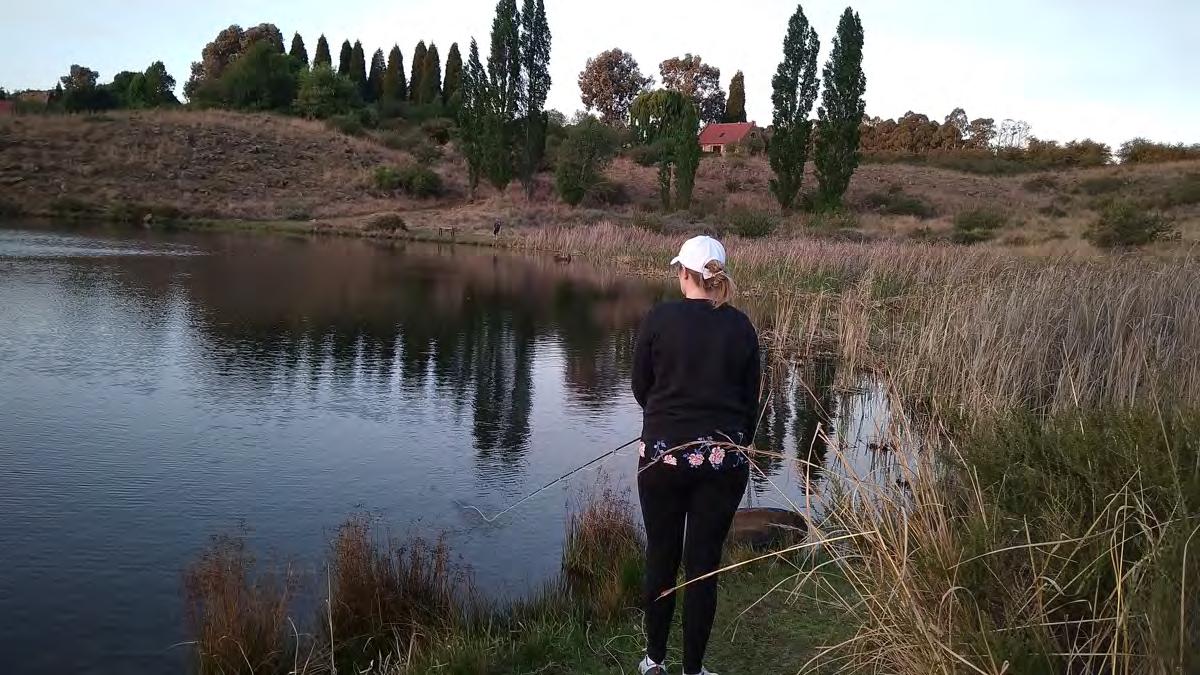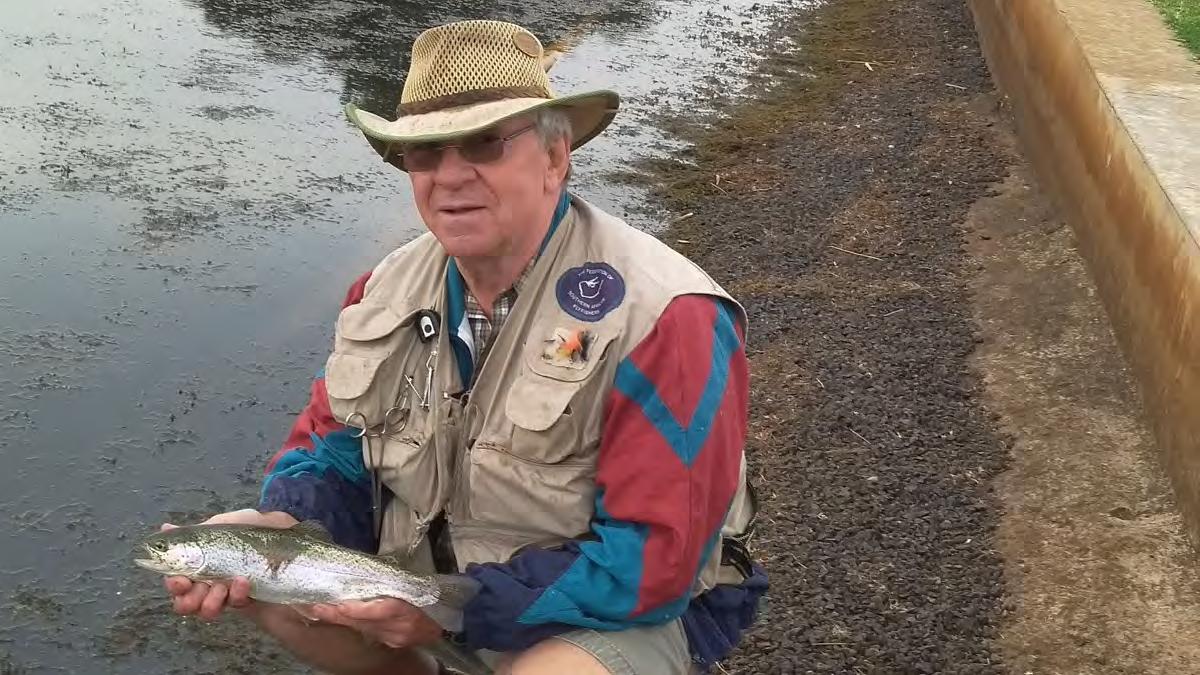
13 minute read
No Run of the Mill Dullstrom without Trout! by Andrew Allman
by Andrew Allman
“Dullstroom without trout! You’ve got to be joking? Where will we stop when we go to Kruger”?
Advertisement
That scenario hardly seems a future that many of us wish to contemplate but it could come to pa s s if the Department of Environmental Affairs succeeds in their plans of listing trout (and other economically viable species) as invasive.
No prizes on my sentiments in this prolonged and calamitous debate but for those of you who are caught inbetween the DEA, academics and angling organisations; what consultation, if any, have you had with regards the National Environmental Management Biodiversity Act (NEMBA) amendments and likely impacts of enforcement? I have seen evidence of 19 papers detailing the biological invasion as though it were the Battle of Majuba. I have seen no orchestrated response from those being invaded. All I know is that we are fundamentally One Country; fighting the ills of poverty, crime and corruption (PCC), yet divided on the apparent conflict in our midst? Recently FOSAF took the unprecedented turn of turning to the Courts for a solution although this action could be delayed by the recent sad passing of the Minister. For those of you who are conservation passionate flyfishers or just Koos and Thando, out there enjoying a weekend away from it all, this article is for you! But it is also for the many who work in the industry and
contribute to making our stay in Dullstroom such a lovely experience, which causes us to return time and again; we salute you all but ask that you stand up NOW and reclaim what is rightfully yours.
The bottom line is trout is a predator and eats indigenous fish, amphibians and invertebrates. But, it has been doing so, for many years and nature has a way of settling issues for itself without the interference of Man. Trout, was however introduced here from abroad, as were the Jacarandas of Pretoria, the Flamingos of the Karoo and a host of other aliens that have become commonplace in our daily lives. Yes, it is right to protect what is endemic to this land but surely there must be a balance?
To however suggest that one size fits all in our myriad spectrum of what we know as the Ra inbow N a tion, wou ld be a n u nd erstatement at the very least. What thrives and occurs naturally in one area, is not necessarily the same for all regions and could have disastrous environmental impacts if there was one standard sweep of the brush for all biodiversity implementation. Imagine, for example if we switched all the trout holding streams to yellow fish or barbel, what would then be impact to that decision? Can we consciously pull the plug on trout and not offer the billion- rand industry an alternative option or at least bridging ground? Can we not live together in harmony? There has to be some common ground that preserves and conserves but does not bite the hand that feeds!
Once, when I was young and impetuous, I could not wait for our annual holiday to leave the city limits for a treasured fly- fishing experience and so I went down to the local spruit and enticed a barbel to my fly. I recall the ensuing ‘fight’ was for me as stimulating as watching the Sunday night newsreader on our b l a c k a n d w h i t e T V, a n n o u n c i n g i n unmodulated tones, the weekend results of English Football games. With no disrespect to either the football supporters or to flyfishers in this particular species category, I cut my line!
But should there not be a place for all in our fledgling democracy with regulated survival programmes based on a proper business case or each species; whether it be threatened or thriving? Should there not be

public marketing of what is at issue with an integral understanding and review of the socio/economic impacts of go/no go/doing nothing? There needs to be better communication! This debate has up until now excluded the user and service provider. There is a decision tree model being bandied about by academia, but I am not sure to what extent the street vendor, lodge owner or restaurant owner in Dullstoom is aware of its existence; nor of its applicability to their own particular circumstance.
For many, the extinction of the Marico Barb may not hold a second thought? Or, what if the Vemiculated Sailfin Catfish ended up in the Braamfontein Spruit, would that get your attention? But what if the purity levels of the very water that you drink were threatened by the increasing numbers of carp dredging up all manner of ills? And, what if your very livelihood were threatened by the proliferation or extermination of aliens? In South Africa, we sometimes sit on the fence. Even to the extent of not making a decision is a reality today. But what if the chang e affected you personall y an d permanently and also those who may follow in your footsteps? Would you still tread so wearily, if you knew more? There is a party, of citizens, both alien and indigenous that sits outsides of Trout SA, DEA, SAIAB, and FOSAF. That is you, Joe Public and where do your sit in this whole conundrum?
It is with this background that I returned to my favourite Mpumulanga town, Dullstroom and to Millstream Farm. It is here, where we were informed there are 22 different flyfishing waters but also not informed that many of those weirs were undergoing maintenance work, and so not fishable. It is here where pollution and weed treatment is on- going and it is here where governing rules abound and good folk tend to follow them for the congeniality of all, who collectively use that private property.
In the ’ little black book’ provided in the Millstream cottages, we learn of the ethos of Millstream expounded by Andrew Levy. The moral obligations of all to the quarry, to other flyfishers, to th e lan d owners, to th e environment and to ourselves.
Simply spoken; to do the right thing, all the time.
Millstream is one of the premier flyfishing estates in Mpumalanga and is well managed but people do not always respect the Big 5 Aspirations of the self- imposed Credo. Sadly, I observed unsavory handling of trout caught and of overcrowding. According to Jackie Vincent the Resort Manager, any overcrowding may be due to hot spots and then it is up the anglers to move

...Many did not and it was a bit like Le Mans with people dashing for a vacant fishable spot. When I speak of ‘fishable’ waters, I include accessibility to space without weed infestation. Jackie, goes on to say that water flowing into the property is analysed every three months. Water quality is a concern particularly the nitrate and ammonia levels, mainly due to poor management of the local municipal sewer works upstream, as these nutrients are what causes algae blooms and excessive weed growth.
Millstream is well governed, yet volume and capacity to handle, together with an element of unruly people still confound even the best intents of any flyfishing establishment. Jackie expound s further “ Pollution of waters throughout the country including the Witpoort river flowing through Millstream is a concern and Millstream Board of Directors and Farm Management are engaged with various role players to try and ensure that the water quality does not deteriorate but we are limited to what we can influence or control”.
My point in raising this aspect, is to question how widespread we as a country comply with the moral values so aptly defined by Millstream? Do we as a general public conform to laws and would the implementation of the aforementioned changes to the Act, be any different from what happens now? Situated at a leisurely- paced two and half hour drive from Johannesburg, Dullstroom is ideally placed for weekend jaunts and there is enough to do in the surrounding area for even longer stays. The town has tried to keep it’s diminutive identity by not yielding to the more lucrative deals offered by mass market retailers and in so doing has created a niche market that is distinctive from its neighbours of Belfast and Lydenburg. I guess one would be wrong in saying that the thriving tourist economy is built on Trout but it does open the poser for debate? Millstream Farm is nicely positioned just a few kilometers outside of the town, and yet far enough away from the offending plastic bags that litter the side of the road and the deafening roar of weekend Harley’s, to make one truly believe that they are out in the countryside. There is a gate levy, presumably for the upkeep of the estate and the rental accommodation does not come cheap, (if you are not staying via a recognised time share company) but then what is the price for peace and tranquility? The whole area is fenced and as per explanation from Jackie is in fact just a boundary/game fence and was never intended to keep people in or out. Security guards with dogs patrol the farm nightly.
We observed from our car, the slanted greeting from the herds of grazing game and a multitude of resort activities, including tennis, horse riding, walking and even playthings for the little one’s, but the real focus of Millstream trip had to be on fishing, flyfishing to be exact and our quarry was non- other than the famed alien itself, TROUT!

Our assigned accomodation was panoramic being built on the raised ground overlooking Millstream Lake with 5 bedrooms,two with double beds and three with twin beds. Two rooms have ensuite bathrooms and the other two bathrooms have a shower and toilet each. Two families of four could therefor easily be accommodated with space enough for the in- laws HIGH UP near the rafters. (pun intended). The living area is open plan and designed such that one need not feel claustrophobic but cosy enough for everyone to snuggle up around the evening fire. There is outside braai facilities and the town is close enough for meals if you are not inclined to cook for yourself.Nights are still

cold in the Mpumalanga Highlands with Dullstroom, sitting at 2000m. This is just about the right altitude for trout to thrive with no closed period being necessary. There is a pub in the town with a fire, which I am told burns constantly, 365 days a year. There can be hot periods followed by cold; and the mist that arises with cooler air can make the whole place look a bit medieval, not unlike Scotland. And, that folks is why Dullstroom, all year round is a hive of activity with weekenders clogging the coffee shops and the local dams and Tourist Buses, diverting their route from the shorter N4 to the potholed R33 just to sample this easy, quaint lifestyle. And it is all thanks to that alien little fellow, the Trout.
But what of the fishing experience in Millstream? Understand there is volume at work here folks and it is managed conservation. Records are kept of fish caught, released and kept to aid restocking programmes. Some fish have been caught a few times and ‘once bitten twice shy’ is a truism for survival. Consequentially, what works in one water does not necessarily apply to others. Nor does, what worked yesterday, automatically follow the same pattern for the next day. It does require a bit of trial and error, which as flyfishers gives us the opportunity to finger select through the plethora of flies that sit in our box.
I do however try to limit my fly selections to a few; to what normally works for me on most waters at different times of the day. I find it hard not to land a trout on my black/ orange beaded Woolly Bugger or even the Red Eyed Damsel. At special times of the day, the DDD rules. Millstream was a little different though.
One evening, the water was like boiling soup with trout rising all over the place but none being interested in my particular offering. I went across to a fellow fly fisher for a chat and he withdrew a self-made variation of a DDD from his box but carelessly dropped it. Both, being the other side of 60, we battled to find the miscreant on the muddy ground and I promptly did the right thing by offering my box, as replacement fly to my new friend. That tended to cement the friendship and we met several times at waters around the estate where we shared useful fishing titbits to one another. I gained a lot of fishing knowledge from my buddy who has been visiting Millstream for more than 20 years. One pearler, was to leave the waters when a certain insect was attempting to enter every orifice of your body as the trout go off the bite. I persisted a few times to fish through the swarm of prying insects but soon found the advice proved correct. I also learned from a young teenage boy who spoke of the papa roach. In windy conditions when the trout feel safe to come out and play, the papa skimmed fast over the water is a killer. Thank you mate for sharing that one with the old man. For the rest, the fish caught and released were small, most under a pound although a few possibly over that mark. I did not take any trout out of the water, preferring to release from the net, as the water temperature was high. Happily, none were killed at my hands. There was also no shortage of fish and if I had a bad fishing day, it was because of me, and not the fishing!
The experiential at Millstream is akin to steak and chips offered by one of the better family restaurants. There is abundant trout and the restaurant goers seemed nice. The fishing industry needs Millstream as much as the patrons need a safe place to rest, eat and follow their passion. There is a feel good vibe emanating from the entrance gate and it keeps on flowing through the public spaces to one’s own assigned area. There is a good spread of trout activities to satisfy both the novice and the pro. Sure, fishing with volume can be a challenge but can also be an opportunity to learn of new dishes, from someone nearby. This smorgasbord of offerings should satisfy every flyfishing whim with even very small streams open to test the flyfisher when water levels do rise. And then, there are the side dishes for those who do not wish to partake in the sport of Kings, but do enjoy getting out with family and friends and just experiencing good times together. All of this is done within rule; and with due care for one another. It is a bit like a laager of fun and peace in a safe environment. My family felt this was the greatest plus factor about Millstream. Will we have our say? Will flyfishing, farming and stocking of waters be affected? Will, I return? Do fish swim?










